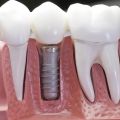Possible Problems With Dental Implants

Dental implants are metal posts, surgically attached to the jawbone, to support an artificial tooth. Once the implant is in place, your dentist or oral surgeon will put the 'new' tooth.
Despite implants having a high success rate, some people experience dental implant failure. About 5-10% of dental implants fail right after the procedure or months or years later.
However, if your general condition is good, the surgery is more likely to be successful. About 93% of implants last for 20 years after the surgery. Though, some patients with periodontal disease, who smoke or do not follow supportive periodontal care are at higher risk of complications and implant failure.
If you're about to have dental implant surgery or have already had one, here's what will be useful for you to know about implant failure or other potential problems.
Early dental implant failure and problems
Early symptoms of implant rejection appear within the first three to four months after the procedure.
You may experience some pain or discomfort after surgery, which can be relieved with pain medication. But if the pain does not go away within 5-7 days, you should contact your dentist. It will take 3 to 6 months for complete healing after the procedure.
You should also pay attention to other possible complications:
Infection at the site of implantation
An infection can develop during or after surgery due to an autoimmune disease, smoking, or poor oral hygiene.
Implant micro-movements
If a dental implant lacks stability, micro-movements of the implant can sometimes occur after an immediate tooth replacement.
The dentist will not attach the artificial tooth to the implant until your jawbone has healed properly. But there are cases when the surgeon performs a tooth replacement immediately after implantation, which can also lead to rejection due to the additional load on the implant.
Lack of bone support
Early rejection of an implant can also occur if the bone is not able to provide proper support, but despite this, the surgeon still completes the procedure. The implant will not properly fuse with the jaw if the bone is not strong enough.
Allergic reaction
If you are allergic to titanium alloy, you may develop an allergic reaction because some dental implants use this metal. Allergy symptoms include swelling, loss of taste, and possibly a tingling sensation.
To avoid rejection of a dental implant, you should tell your dentist if you are allergic to titanium. They will select an implant for you from a different material.
Failure to follow the doctor's instructions
You must follow all of your surgeon's instructions after surgery. Otherwise, you risk losing your dental implant. To reduce the risk of complications, your dentist may recommend that you eat soft foods, practice good oral hygiene, and avoid lozenges until the implant site has healed.
Late dental implant failure and problems
Some dental implant problems may not appear until several years after the surgery.
These types of complications include:
- Nerve or tissue damage. This can happen if the surgeon places the implant too close to the nerve. You may feel numbness or tingling of the tongue, lips, gums, or face.
- Rejection of dental implants. This does not happen often, but if it does, you will feel increased pain at the implant site, swelling, fever, and chills.
- An upper jaw dental implant may extend into the sinus cavity.
- Damaging the area around a dental implant can weaken it and cause rejection.
Continue to practice proper hygiene and maintain your mouth, implants, and gums healthy to reduce the chance of long-term complications. Brush and floss at least twice a day, rinse your mouth with mouthwash, and schedule regular dental examinations.
Signs of dental implant rejection
In the early or late stages of dental implant rejection, you may experience: - severe pain or discomfort - gum disease - increased edema - gum recession - chewing difficulties - loosening of the implant or replacement tooth
Conclusion
In many circumstances, dental implants are regarded as safe. But if you decide to consider other choices, there are various alternatives to dental implants. Make sure to consult your dentist about your situation.
Other articles and publications:
Articles and publications of other companies:
- +1 (646) 270-9836
- Long Island City
- grantny.com













